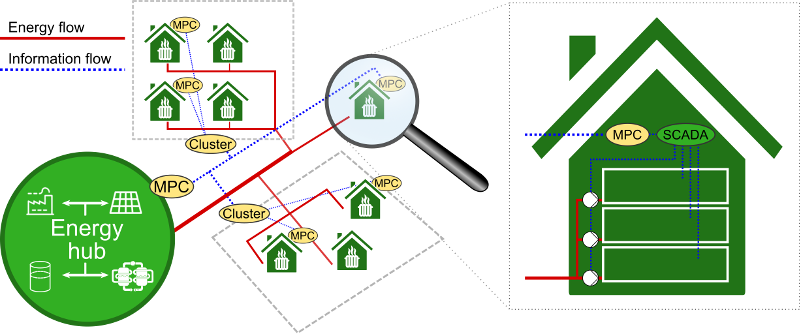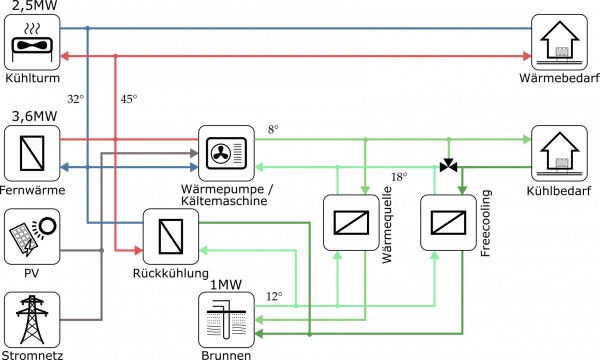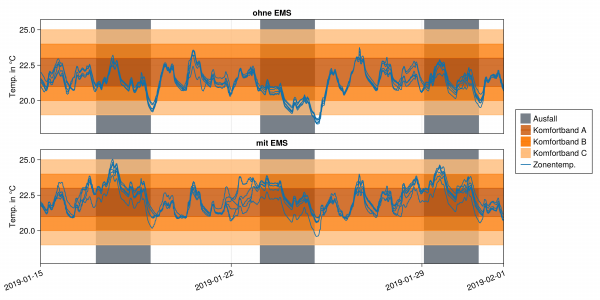ÖKO-OPT-AKTIV - Optimised control and operating behaviour of thermally activated buildings in future urban districts
Short Description
Status
Completed (January 2022)
Starting point, contents and results
In the efforts to make urban energy systems more environmentally friendly and at the same time more cost-efficient, a large savings potential has been demonstrated in recent decades through improved building envelopes and the inclusion of renewable energy sources. In contrast, the investigation of the interplay of the energy systems of the individual buildings, on the level of entire city districts, is only in the early stages.
The project ÖKO-OPT-AKTIV aims to improve the control strategies of the energy systems of entire urban districts. Through an optimised interaction of the buildings' own subsystems, the inclusion of volatile regenerative energy sources and central storage management, both economic and ecological improvement potentials will be activated.
Based on the current development of the energy system of a future urban quarter in Graz-Reininghaus, an adaptive, model predictive control strategy for the energy supply of future urban quarters was developed. The model predictive control of the energy hub developed in the previous project ÖKO-OPT-QUART was supplemented by communication with the control systems in the individual buildings and extended to a comprehensive, self-learning overall control concept for the entire district. The individual buildings are heated and cooled via thermally activated components and supplied via a low-temperature local heating and cooling network including a central hot water storage fed by ground water heat pumps. In addition, an urban photovoltaic power plant supports the supply of electrical energy. The developments and analyses are carried out on the basis of detailed thermo-electric simulation models, where the modelling of the thermally activated components is based on the results of the solSPONGEhigh project.
The adaptive, model predictive control is subjected to unexpected climatic conditions, technical failures and variable tariffs in order to test its robustness and further develop its practical suitability.
The result is an adaptive, model-predictive control system that ensures resilient and cost- or emission-minimized operation of the overall energy system of a city district through optimal management of the central energy storage facilities and the thermally activated buildings.
A real implementation of the developed concepts is envisaged in follow-up projects such as the Model Region project „UserGRIDs". There, the feasibility and practicability of the approach will be tested under real conditions. The integration of the algorithms and methods into off-the-shelf PLCs and infrastructure, their integration into existing SCADA systems will be investigated in the future.
Project Images
Terms of use: The pictures listed underneath the header “Project Pictures” originate from the projects in the frame of the programmes City of Tomorrow, Building of Tomorrow and the IEA Research Cooperation. They may be used credited for non-commercial purposes under the Creative Commons License Attribution-NonCommercial (CC BY-NC).
Project Partners
Project management
BIOENERGY 2020+ GmbH
Project or cooperation partners
- Graz University of Technology, Institute of Thermal Engineering
- AEE – Institute for Sustainable Technologies
- ISWAT GmbH
- TB-STARCHEL Ingenieurbüro-GmbH
- PMC - Gebäudetechnik Planungs GmbH
- Markus Nebel Handelsvertretung GmbH
Contact Address
Dr. Daniel Muschick
Inffeldgasse 21b, 8010 Graz
Tel.: +43 (316) 873-9248
Fax: +43 (316) 873-9202
E-mail: daniel.muschick@bioenergy2020.eu
Web: https://www.bioenergy2020.eu/de/kompetenzbereiche/alle_projekte/view/637






